BUACC5935 Auditing: Impact of Independence on Corporate Scandals
VerifiedAdded on 2023/04/21
|8
|2613
|101
Essay
AI Summary
This essay delves into the critical role of auditor independence in preventing corporate collapses, using Enron and Lehman Brothers as case studies. It highlights how the lack of independence and professional skepticism contributed to these failures, with auditors prioritizing fees and client relationships over objective reporting. The essay discusses the impact of fee dependency on auditor independence, referencing APES 110 and examining how large audit fees can create self-interest and intimidation threats. It differentiates between independence of mind and independence in appearance, emphasizing the importance of unbiased professional opinions. Furthermore, the essay outlines the differences between ASA 200 and ASA 700 in the context of Australian Auditing Standards, underscoring the need for auditors to comply with ethical requirements, maintain professional judgment, and reduce audit risk. The essay concludes that auditor independence is paramount for developing influence-free audit opinions and preventing future corporate scandals. Desklib provides access to similar solved assignments and past papers for students.
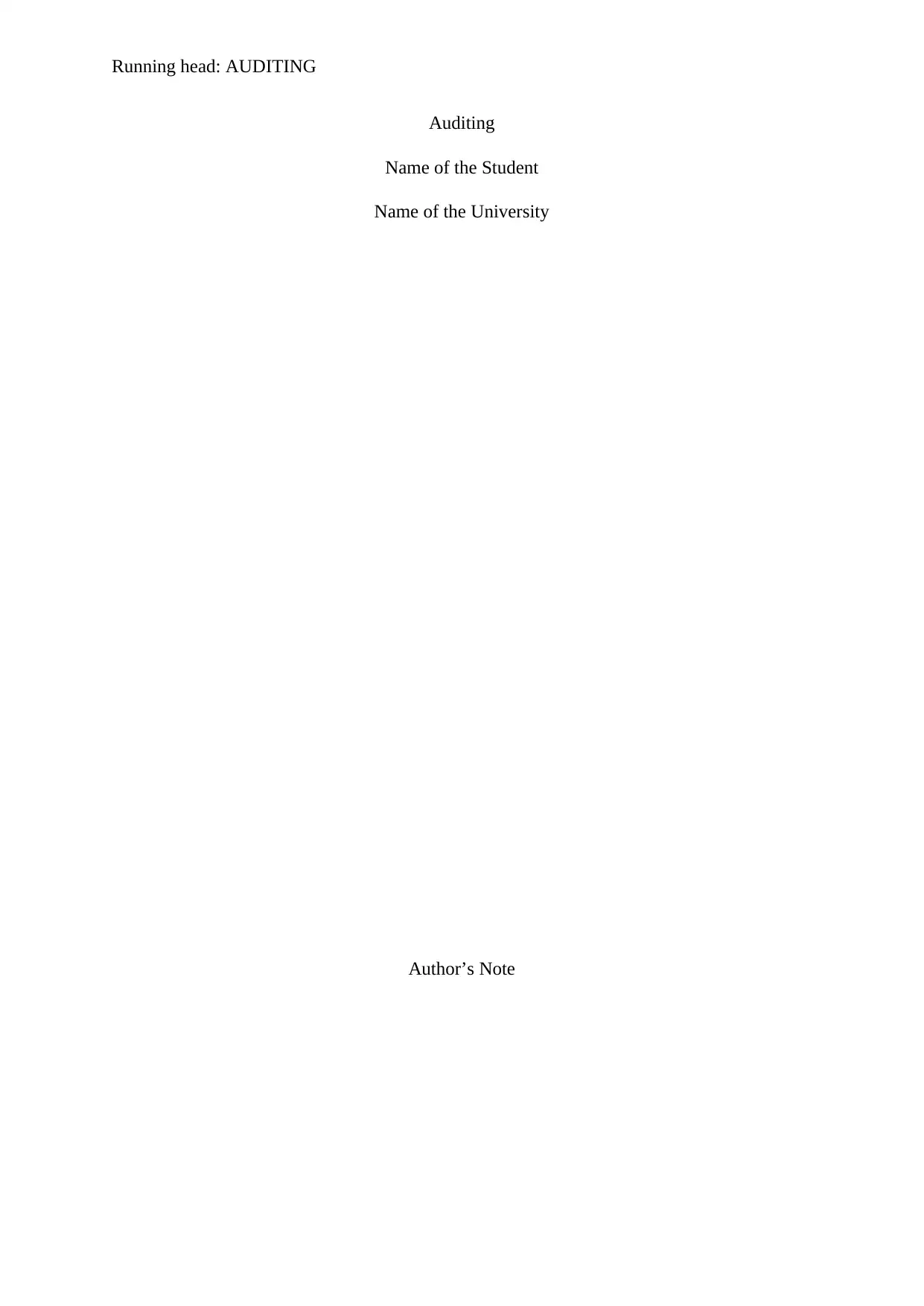
Running head: AUDITING
Auditing
Name of the Student
Name of the University
Author’s Note
Auditing
Name of the Student
Name of the University
Author’s Note
Paraphrase This Document
Need a fresh take? Get an instant paraphrase of this document with our AI Paraphraser
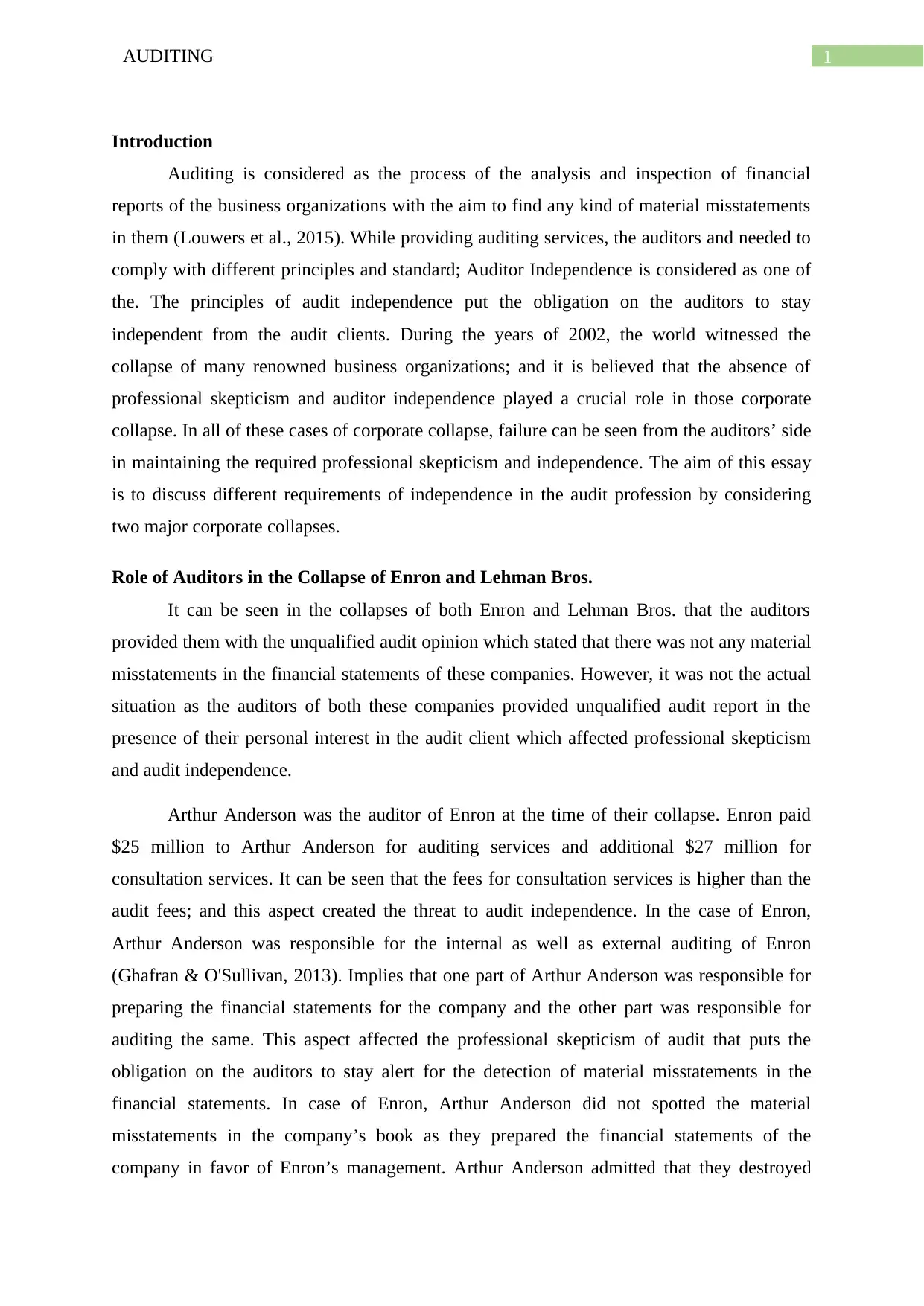
1AUDITING
Introduction
Auditing is considered as the process of the analysis and inspection of financial
reports of the business organizations with the aim to find any kind of material misstatements
in them (Louwers et al., 2015). While providing auditing services, the auditors and needed to
comply with different principles and standard; Auditor Independence is considered as one of
the. The principles of audit independence put the obligation on the auditors to stay
independent from the audit clients. During the years of 2002, the world witnessed the
collapse of many renowned business organizations; and it is believed that the absence of
professional skepticism and auditor independence played a crucial role in those corporate
collapse. In all of these cases of corporate collapse, failure can be seen from the auditors’ side
in maintaining the required professional skepticism and independence. The aim of this essay
is to discuss different requirements of independence in the audit profession by considering
two major corporate collapses.
Role of Auditors in the Collapse of Enron and Lehman Bros.
It can be seen in the collapses of both Enron and Lehman Bros. that the auditors
provided them with the unqualified audit opinion which stated that there was not any material
misstatements in the financial statements of these companies. However, it was not the actual
situation as the auditors of both these companies provided unqualified audit report in the
presence of their personal interest in the audit client which affected professional skepticism
and audit independence.
Arthur Anderson was the auditor of Enron at the time of their collapse. Enron paid
$25 million to Arthur Anderson for auditing services and additional $27 million for
consultation services. It can be seen that the fees for consultation services is higher than the
audit fees; and this aspect created the threat to audit independence. In the case of Enron,
Arthur Anderson was responsible for the internal as well as external auditing of Enron
(Ghafran & O'Sullivan, 2013). Implies that one part of Arthur Anderson was responsible for
preparing the financial statements for the company and the other part was responsible for
auditing the same. This aspect affected the professional skepticism of audit that puts the
obligation on the auditors to stay alert for the detection of material misstatements in the
financial statements. In case of Enron, Arthur Anderson did not spotted the material
misstatements in the company’s book as they prepared the financial statements of the
company in favor of Enron’s management. Arthur Anderson admitted that they destroyed
Introduction
Auditing is considered as the process of the analysis and inspection of financial
reports of the business organizations with the aim to find any kind of material misstatements
in them (Louwers et al., 2015). While providing auditing services, the auditors and needed to
comply with different principles and standard; Auditor Independence is considered as one of
the. The principles of audit independence put the obligation on the auditors to stay
independent from the audit clients. During the years of 2002, the world witnessed the
collapse of many renowned business organizations; and it is believed that the absence of
professional skepticism and auditor independence played a crucial role in those corporate
collapse. In all of these cases of corporate collapse, failure can be seen from the auditors’ side
in maintaining the required professional skepticism and independence. The aim of this essay
is to discuss different requirements of independence in the audit profession by considering
two major corporate collapses.
Role of Auditors in the Collapse of Enron and Lehman Bros.
It can be seen in the collapses of both Enron and Lehman Bros. that the auditors
provided them with the unqualified audit opinion which stated that there was not any material
misstatements in the financial statements of these companies. However, it was not the actual
situation as the auditors of both these companies provided unqualified audit report in the
presence of their personal interest in the audit client which affected professional skepticism
and audit independence.
Arthur Anderson was the auditor of Enron at the time of their collapse. Enron paid
$25 million to Arthur Anderson for auditing services and additional $27 million for
consultation services. It can be seen that the fees for consultation services is higher than the
audit fees; and this aspect created the threat to audit independence. In the case of Enron,
Arthur Anderson was responsible for the internal as well as external auditing of Enron
(Ghafran & O'Sullivan, 2013). Implies that one part of Arthur Anderson was responsible for
preparing the financial statements for the company and the other part was responsible for
auditing the same. This aspect affected the professional skepticism of audit that puts the
obligation on the auditors to stay alert for the detection of material misstatements in the
financial statements. In case of Enron, Arthur Anderson did not spotted the material
misstatements in the company’s book as they prepared the financial statements of the
company in favor of Enron’s management. Arthur Anderson admitted that they destroyed
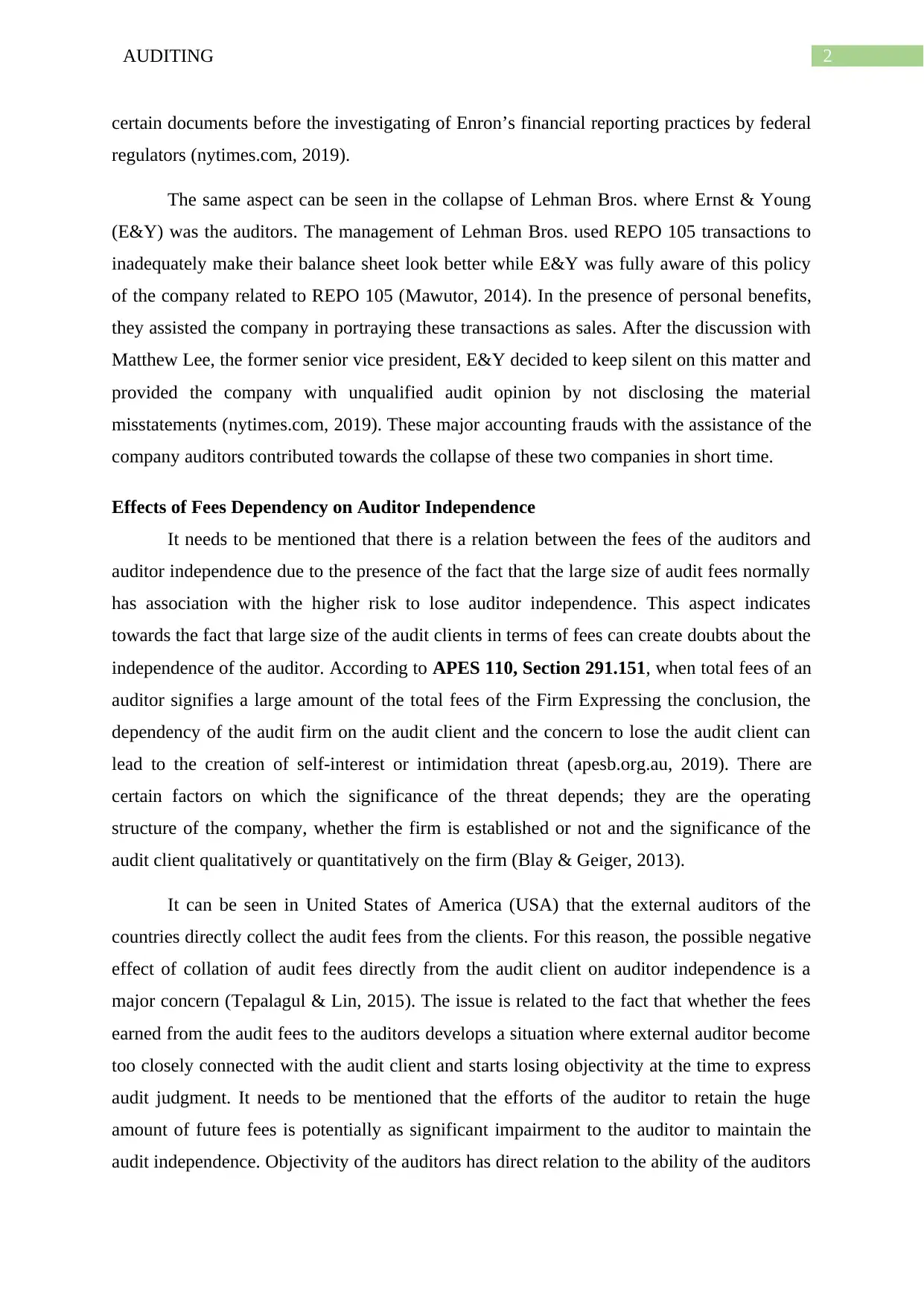
2AUDITING
certain documents before the investigating of Enron’s financial reporting practices by federal
regulators (nytimes.com, 2019).
The same aspect can be seen in the collapse of Lehman Bros. where Ernst & Young
(E&Y) was the auditors. The management of Lehman Bros. used REPO 105 transactions to
inadequately make their balance sheet look better while E&Y was fully aware of this policy
of the company related to REPO 105 (Mawutor, 2014). In the presence of personal benefits,
they assisted the company in portraying these transactions as sales. After the discussion with
Matthew Lee, the former senior vice president, E&Y decided to keep silent on this matter and
provided the company with unqualified audit opinion by not disclosing the material
misstatements (nytimes.com, 2019). These major accounting frauds with the assistance of the
company auditors contributed towards the collapse of these two companies in short time.
Effects of Fees Dependency on Auditor Independence
It needs to be mentioned that there is a relation between the fees of the auditors and
auditor independence due to the presence of the fact that the large size of audit fees normally
has association with the higher risk to lose auditor independence. This aspect indicates
towards the fact that large size of the audit clients in terms of fees can create doubts about the
independence of the auditor. According to APES 110, Section 291.151, when total fees of an
auditor signifies a large amount of the total fees of the Firm Expressing the conclusion, the
dependency of the audit firm on the audit client and the concern to lose the audit client can
lead to the creation of self-interest or intimidation threat (apesb.org.au, 2019). There are
certain factors on which the significance of the threat depends; they are the operating
structure of the company, whether the firm is established or not and the significance of the
audit client qualitatively or quantitatively on the firm (Blay & Geiger, 2013).
It can be seen in United States of America (USA) that the external auditors of the
countries directly collect the audit fees from the clients. For this reason, the possible negative
effect of collation of audit fees directly from the audit client on auditor independence is a
major concern (Tepalagul & Lin, 2015). The issue is related to the fact that whether the fees
earned from the audit fees to the auditors develops a situation where external auditor become
too closely connected with the audit client and starts losing objectivity at the time to express
audit judgment. It needs to be mentioned that the efforts of the auditor to retain the huge
amount of future fees is potentially as significant impairment to the auditor to maintain the
audit independence. Objectivity of the auditors has direct relation to the ability of the auditors
certain documents before the investigating of Enron’s financial reporting practices by federal
regulators (nytimes.com, 2019).
The same aspect can be seen in the collapse of Lehman Bros. where Ernst & Young
(E&Y) was the auditors. The management of Lehman Bros. used REPO 105 transactions to
inadequately make their balance sheet look better while E&Y was fully aware of this policy
of the company related to REPO 105 (Mawutor, 2014). In the presence of personal benefits,
they assisted the company in portraying these transactions as sales. After the discussion with
Matthew Lee, the former senior vice president, E&Y decided to keep silent on this matter and
provided the company with unqualified audit opinion by not disclosing the material
misstatements (nytimes.com, 2019). These major accounting frauds with the assistance of the
company auditors contributed towards the collapse of these two companies in short time.
Effects of Fees Dependency on Auditor Independence
It needs to be mentioned that there is a relation between the fees of the auditors and
auditor independence due to the presence of the fact that the large size of audit fees normally
has association with the higher risk to lose auditor independence. This aspect indicates
towards the fact that large size of the audit clients in terms of fees can create doubts about the
independence of the auditor. According to APES 110, Section 291.151, when total fees of an
auditor signifies a large amount of the total fees of the Firm Expressing the conclusion, the
dependency of the audit firm on the audit client and the concern to lose the audit client can
lead to the creation of self-interest or intimidation threat (apesb.org.au, 2019). There are
certain factors on which the significance of the threat depends; they are the operating
structure of the company, whether the firm is established or not and the significance of the
audit client qualitatively or quantitatively on the firm (Blay & Geiger, 2013).
It can be seen in United States of America (USA) that the external auditors of the
countries directly collect the audit fees from the clients. For this reason, the possible negative
effect of collation of audit fees directly from the audit client on auditor independence is a
major concern (Tepalagul & Lin, 2015). The issue is related to the fact that whether the fees
earned from the audit fees to the auditors develops a situation where external auditor become
too closely connected with the audit client and starts losing objectivity at the time to express
audit judgment. It needs to be mentioned that the efforts of the auditor to retain the huge
amount of future fees is potentially as significant impairment to the auditor to maintain the
audit independence. Objectivity of the auditors has direct relation to the ability of the auditors
⊘ This is a preview!⊘
Do you want full access?
Subscribe today to unlock all pages.

Trusted by 1+ million students worldwide
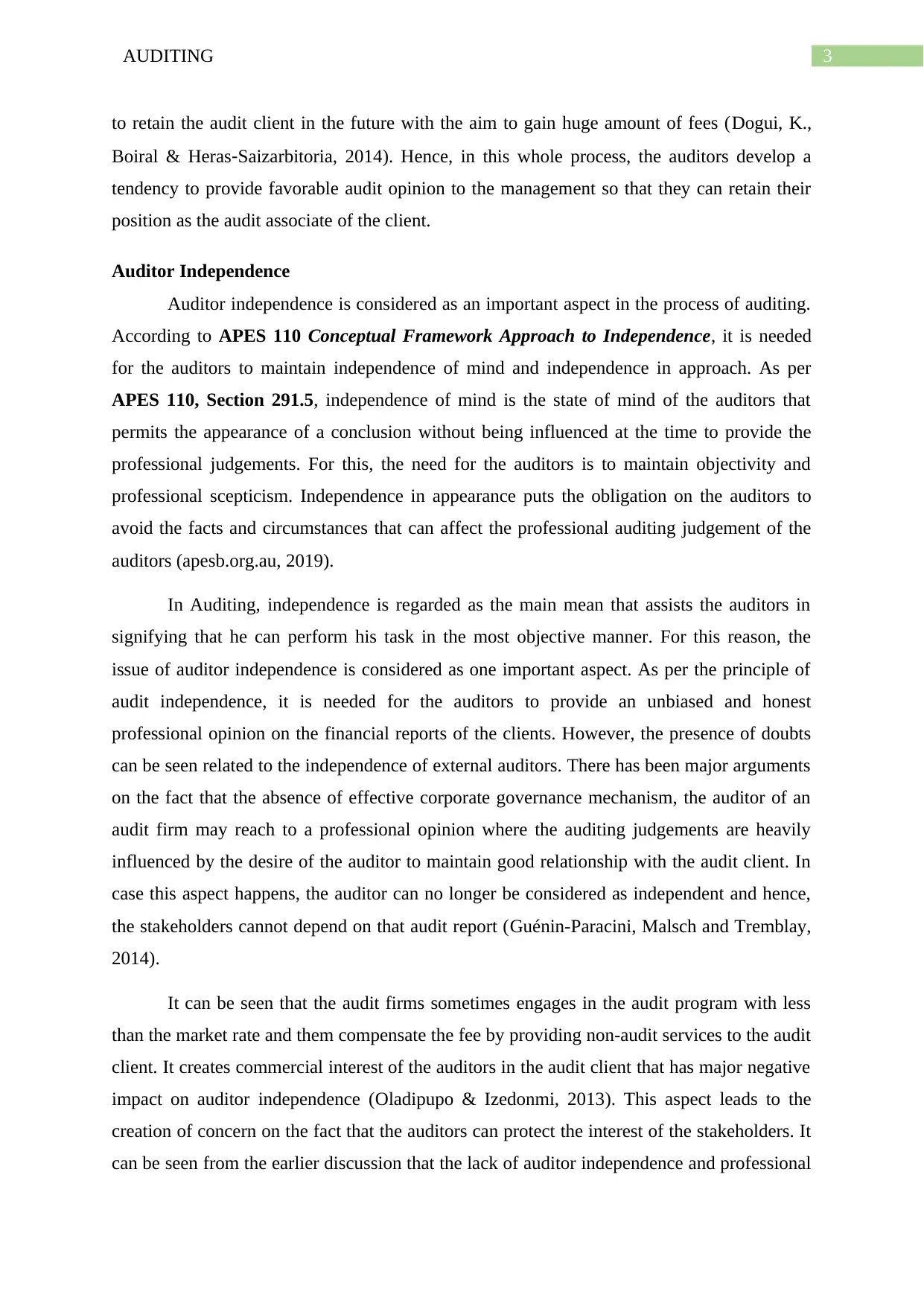
3AUDITING
to retain the audit client in the future with the aim to gain huge amount of fees (Dogui, K.,
Boiral & Heras‐Saizarbitoria, 2014). Hence, in this whole process, the auditors develop a
tendency to provide favorable audit opinion to the management so that they can retain their
position as the audit associate of the client.
Auditor Independence
Auditor independence is considered as an important aspect in the process of auditing.
According to APES 110 Conceptual Framework Approach to Independence, it is needed
for the auditors to maintain independence of mind and independence in approach. As per
APES 110, Section 291.5, independence of mind is the state of mind of the auditors that
permits the appearance of a conclusion without being influenced at the time to provide the
professional judgements. For this, the need for the auditors is to maintain objectivity and
professional scepticism. Independence in appearance puts the obligation on the auditors to
avoid the facts and circumstances that can affect the professional auditing judgement of the
auditors (apesb.org.au, 2019).
In Auditing, independence is regarded as the main mean that assists the auditors in
signifying that he can perform his task in the most objective manner. For this reason, the
issue of auditor independence is considered as one important aspect. As per the principle of
audit independence, it is needed for the auditors to provide an unbiased and honest
professional opinion on the financial reports of the clients. However, the presence of doubts
can be seen related to the independence of external auditors. There has been major arguments
on the fact that the absence of effective corporate governance mechanism, the auditor of an
audit firm may reach to a professional opinion where the auditing judgements are heavily
influenced by the desire of the auditor to maintain good relationship with the audit client. In
case this aspect happens, the auditor can no longer be considered as independent and hence,
the stakeholders cannot depend on that audit report (Guénin-Paracini, Malsch and Tremblay,
2014).
It can be seen that the audit firms sometimes engages in the audit program with less
than the market rate and them compensate the fee by providing non-audit services to the audit
client. It creates commercial interest of the auditors in the audit client that has major negative
impact on auditor independence (Oladipupo & Izedonmi, 2013). This aspect leads to the
creation of concern on the fact that the auditors can protect the interest of the stakeholders. It
can be seen from the earlier discussion that the lack of auditor independence and professional
to retain the audit client in the future with the aim to gain huge amount of fees (Dogui, K.,
Boiral & Heras‐Saizarbitoria, 2014). Hence, in this whole process, the auditors develop a
tendency to provide favorable audit opinion to the management so that they can retain their
position as the audit associate of the client.
Auditor Independence
Auditor independence is considered as an important aspect in the process of auditing.
According to APES 110 Conceptual Framework Approach to Independence, it is needed
for the auditors to maintain independence of mind and independence in approach. As per
APES 110, Section 291.5, independence of mind is the state of mind of the auditors that
permits the appearance of a conclusion without being influenced at the time to provide the
professional judgements. For this, the need for the auditors is to maintain objectivity and
professional scepticism. Independence in appearance puts the obligation on the auditors to
avoid the facts and circumstances that can affect the professional auditing judgement of the
auditors (apesb.org.au, 2019).
In Auditing, independence is regarded as the main mean that assists the auditors in
signifying that he can perform his task in the most objective manner. For this reason, the
issue of auditor independence is considered as one important aspect. As per the principle of
audit independence, it is needed for the auditors to provide an unbiased and honest
professional opinion on the financial reports of the clients. However, the presence of doubts
can be seen related to the independence of external auditors. There has been major arguments
on the fact that the absence of effective corporate governance mechanism, the auditor of an
audit firm may reach to a professional opinion where the auditing judgements are heavily
influenced by the desire of the auditor to maintain good relationship with the audit client. In
case this aspect happens, the auditor can no longer be considered as independent and hence,
the stakeholders cannot depend on that audit report (Guénin-Paracini, Malsch and Tremblay,
2014).
It can be seen that the audit firms sometimes engages in the audit program with less
than the market rate and them compensate the fee by providing non-audit services to the audit
client. It creates commercial interest of the auditors in the audit client that has major negative
impact on auditor independence (Oladipupo & Izedonmi, 2013). This aspect leads to the
creation of concern on the fact that the auditors can protect the interest of the stakeholders. It
can be seen from the earlier discussion that the lack of auditor independence and professional
Paraphrase This Document
Need a fresh take? Get an instant paraphrase of this document with our AI Paraphraser
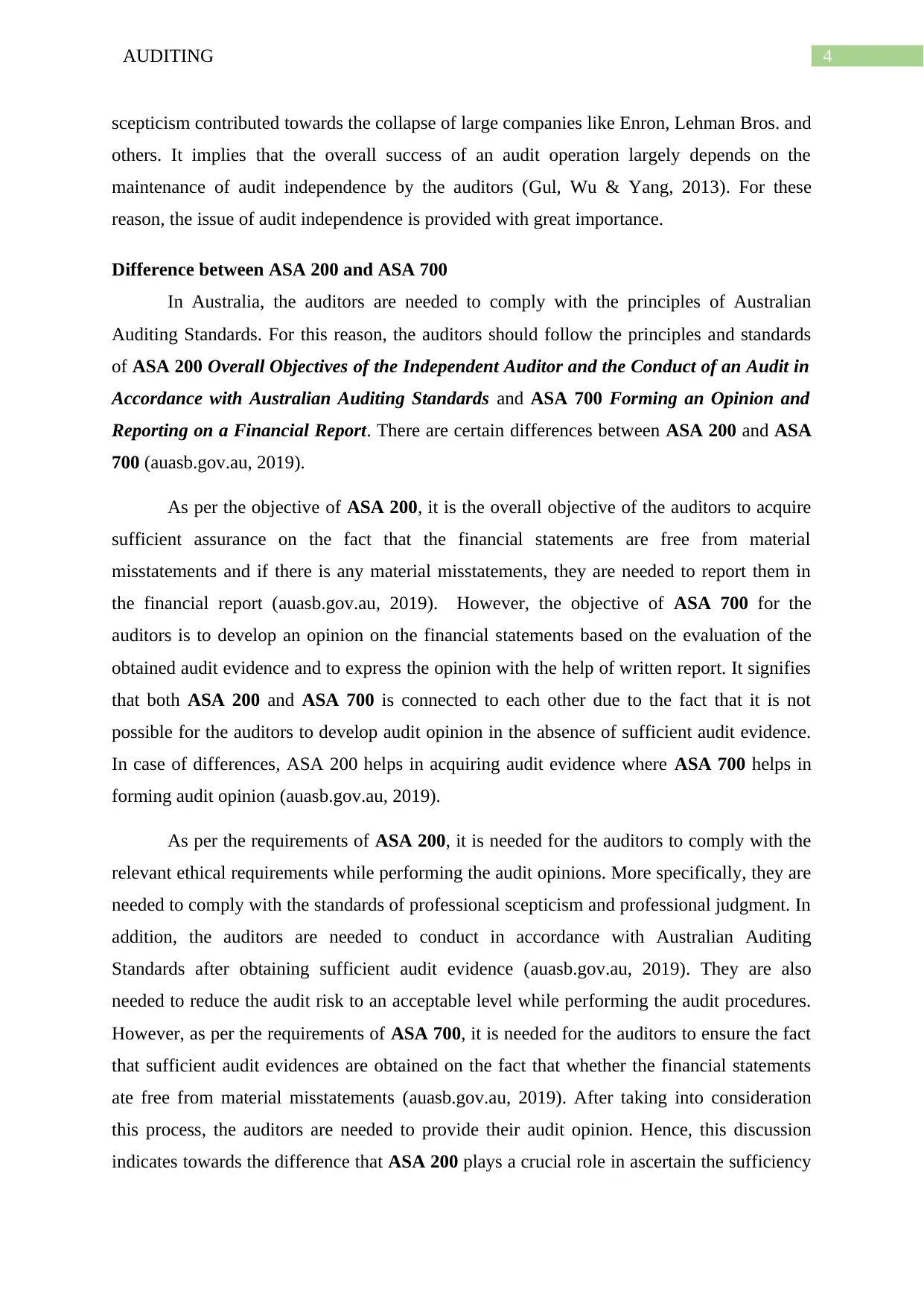
4AUDITING
scepticism contributed towards the collapse of large companies like Enron, Lehman Bros. and
others. It implies that the overall success of an audit operation largely depends on the
maintenance of audit independence by the auditors (Gul, Wu & Yang, 2013). For these
reason, the issue of audit independence is provided with great importance.
Difference between ASA 200 and ASA 700
In Australia, the auditors are needed to comply with the principles of Australian
Auditing Standards. For this reason, the auditors should follow the principles and standards
of ASA 200 Overall Objectives of the Independent Auditor and the Conduct of an Audit in
Accordance with Australian Auditing Standards and ASA 700 Forming an Opinion and
Reporting on a Financial Report. There are certain differences between ASA 200 and ASA
700 (auasb.gov.au, 2019).
As per the objective of ASA 200, it is the overall objective of the auditors to acquire
sufficient assurance on the fact that the financial statements are free from material
misstatements and if there is any material misstatements, they are needed to report them in
the financial report (auasb.gov.au, 2019). However, the objective of ASA 700 for the
auditors is to develop an opinion on the financial statements based on the evaluation of the
obtained audit evidence and to express the opinion with the help of written report. It signifies
that both ASA 200 and ASA 700 is connected to each other due to the fact that it is not
possible for the auditors to develop audit opinion in the absence of sufficient audit evidence.
In case of differences, ASA 200 helps in acquiring audit evidence where ASA 700 helps in
forming audit opinion (auasb.gov.au, 2019).
As per the requirements of ASA 200, it is needed for the auditors to comply with the
relevant ethical requirements while performing the audit opinions. More specifically, they are
needed to comply with the standards of professional scepticism and professional judgment. In
addition, the auditors are needed to conduct in accordance with Australian Auditing
Standards after obtaining sufficient audit evidence (auasb.gov.au, 2019). They are also
needed to reduce the audit risk to an acceptable level while performing the audit procedures.
However, as per the requirements of ASA 700, it is needed for the auditors to ensure the fact
that sufficient audit evidences are obtained on the fact that whether the financial statements
ate free from material misstatements (auasb.gov.au, 2019). After taking into consideration
this process, the auditors are needed to provide their audit opinion. Hence, this discussion
indicates towards the difference that ASA 200 plays a crucial role in ascertain the sufficiency
scepticism contributed towards the collapse of large companies like Enron, Lehman Bros. and
others. It implies that the overall success of an audit operation largely depends on the
maintenance of audit independence by the auditors (Gul, Wu & Yang, 2013). For these
reason, the issue of audit independence is provided with great importance.
Difference between ASA 200 and ASA 700
In Australia, the auditors are needed to comply with the principles of Australian
Auditing Standards. For this reason, the auditors should follow the principles and standards
of ASA 200 Overall Objectives of the Independent Auditor and the Conduct of an Audit in
Accordance with Australian Auditing Standards and ASA 700 Forming an Opinion and
Reporting on a Financial Report. There are certain differences between ASA 200 and ASA
700 (auasb.gov.au, 2019).
As per the objective of ASA 200, it is the overall objective of the auditors to acquire
sufficient assurance on the fact that the financial statements are free from material
misstatements and if there is any material misstatements, they are needed to report them in
the financial report (auasb.gov.au, 2019). However, the objective of ASA 700 for the
auditors is to develop an opinion on the financial statements based on the evaluation of the
obtained audit evidence and to express the opinion with the help of written report. It signifies
that both ASA 200 and ASA 700 is connected to each other due to the fact that it is not
possible for the auditors to develop audit opinion in the absence of sufficient audit evidence.
In case of differences, ASA 200 helps in acquiring audit evidence where ASA 700 helps in
forming audit opinion (auasb.gov.au, 2019).
As per the requirements of ASA 200, it is needed for the auditors to comply with the
relevant ethical requirements while performing the audit opinions. More specifically, they are
needed to comply with the standards of professional scepticism and professional judgment. In
addition, the auditors are needed to conduct in accordance with Australian Auditing
Standards after obtaining sufficient audit evidence (auasb.gov.au, 2019). They are also
needed to reduce the audit risk to an acceptable level while performing the audit procedures.
However, as per the requirements of ASA 700, it is needed for the auditors to ensure the fact
that sufficient audit evidences are obtained on the fact that whether the financial statements
ate free from material misstatements (auasb.gov.au, 2019). After taking into consideration
this process, the auditors are needed to provide their audit opinion. Hence, this discussion
indicates towards the difference that ASA 200 plays a crucial role in ascertain the sufficiency
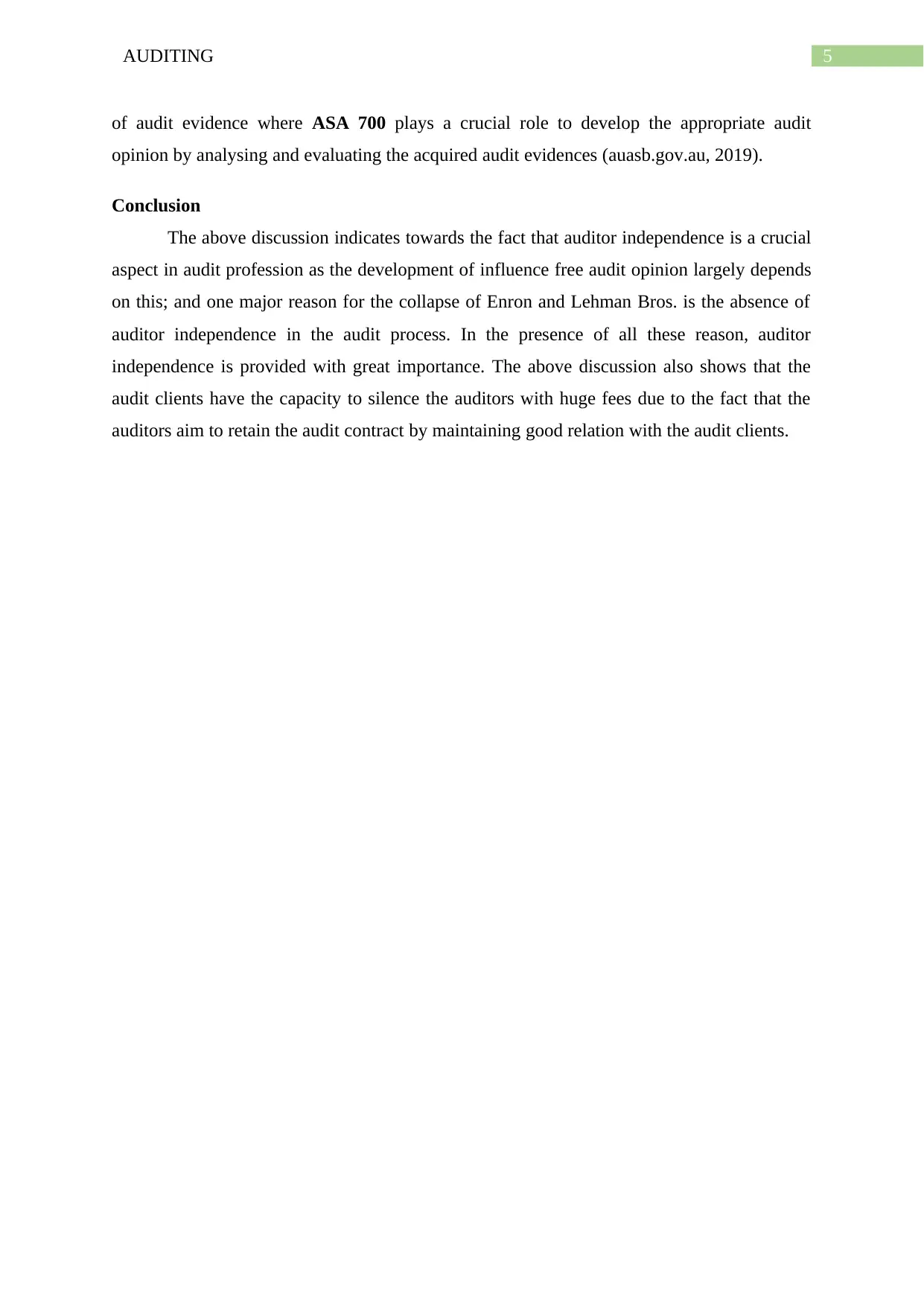
5AUDITING
of audit evidence where ASA 700 plays a crucial role to develop the appropriate audit
opinion by analysing and evaluating the acquired audit evidences (auasb.gov.au, 2019).
Conclusion
The above discussion indicates towards the fact that auditor independence is a crucial
aspect in audit profession as the development of influence free audit opinion largely depends
on this; and one major reason for the collapse of Enron and Lehman Bros. is the absence of
auditor independence in the audit process. In the presence of all these reason, auditor
independence is provided with great importance. The above discussion also shows that the
audit clients have the capacity to silence the auditors with huge fees due to the fact that the
auditors aim to retain the audit contract by maintaining good relation with the audit clients.
of audit evidence where ASA 700 plays a crucial role to develop the appropriate audit
opinion by analysing and evaluating the acquired audit evidences (auasb.gov.au, 2019).
Conclusion
The above discussion indicates towards the fact that auditor independence is a crucial
aspect in audit profession as the development of influence free audit opinion largely depends
on this; and one major reason for the collapse of Enron and Lehman Bros. is the absence of
auditor independence in the audit process. In the presence of all these reason, auditor
independence is provided with great importance. The above discussion also shows that the
audit clients have the capacity to silence the auditors with huge fees due to the fact that the
auditors aim to retain the audit contract by maintaining good relation with the audit clients.
⊘ This is a preview!⊘
Do you want full access?
Subscribe today to unlock all pages.

Trusted by 1+ million students worldwide
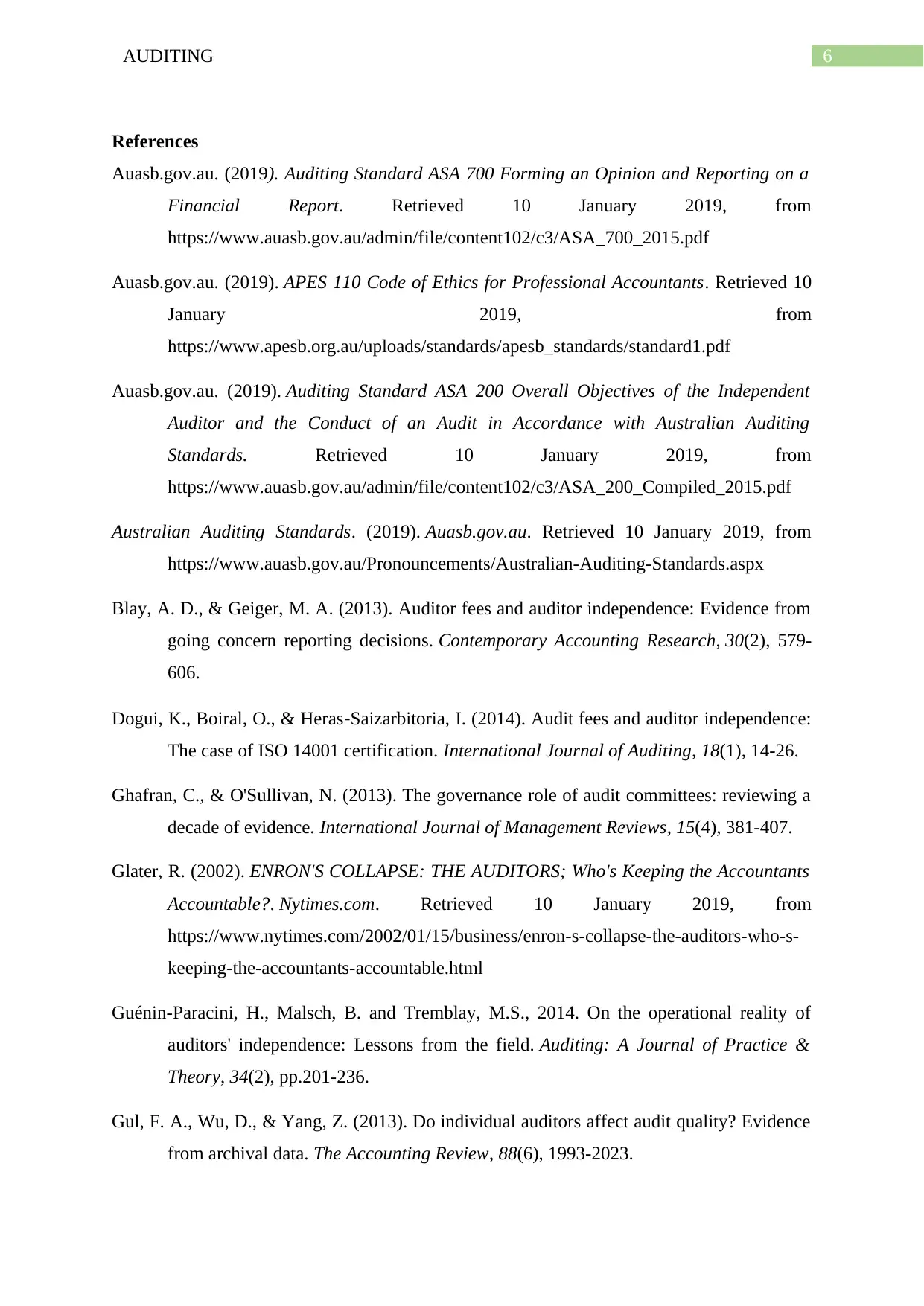
6AUDITING
References
Auasb.gov.au. (2019). Auditing Standard ASA 700 Forming an Opinion and Reporting on a
Financial Report. Retrieved 10 January 2019, from
https://www.auasb.gov.au/admin/file/content102/c3/ASA_700_2015.pdf
Auasb.gov.au. (2019). APES 110 Code of Ethics for Professional Accountants. Retrieved 10
January 2019, from
https://www.apesb.org.au/uploads/standards/apesb_standards/standard1.pdf
Auasb.gov.au. (2019). Auditing Standard ASA 200 Overall Objectives of the Independent
Auditor and the Conduct of an Audit in Accordance with Australian Auditing
Standards. Retrieved 10 January 2019, from
https://www.auasb.gov.au/admin/file/content102/c3/ASA_200_Compiled_2015.pdf
Australian Auditing Standards. (2019). Auasb.gov.au. Retrieved 10 January 2019, from
https://www.auasb.gov.au/Pronouncements/Australian-Auditing-Standards.aspx
Blay, A. D., & Geiger, M. A. (2013). Auditor fees and auditor independence: Evidence from
going concern reporting decisions. Contemporary Accounting Research, 30(2), 579-
606.
Dogui, K., Boiral, O., & Heras‐Saizarbitoria, I. (2014). Audit fees and auditor independence:
The case of ISO 14001 certification. International Journal of Auditing, 18(1), 14-26.
Ghafran, C., & O'Sullivan, N. (2013). The governance role of audit committees: reviewing a
decade of evidence. International Journal of Management Reviews, 15(4), 381-407.
Glater, R. (2002). ENRON'S COLLAPSE: THE AUDITORS; Who's Keeping the Accountants
Accountable?. Nytimes.com. Retrieved 10 January 2019, from
https://www.nytimes.com/2002/01/15/business/enron-s-collapse-the-auditors-who-s-
keeping-the-accountants-accountable.html
Guénin-Paracini, H., Malsch, B. and Tremblay, M.S., 2014. On the operational reality of
auditors' independence: Lessons from the field. Auditing: A Journal of Practice &
Theory, 34(2), pp.201-236.
Gul, F. A., Wu, D., & Yang, Z. (2013). Do individual auditors affect audit quality? Evidence
from archival data. The Accounting Review, 88(6), 1993-2023.
References
Auasb.gov.au. (2019). Auditing Standard ASA 700 Forming an Opinion and Reporting on a
Financial Report. Retrieved 10 January 2019, from
https://www.auasb.gov.au/admin/file/content102/c3/ASA_700_2015.pdf
Auasb.gov.au. (2019). APES 110 Code of Ethics for Professional Accountants. Retrieved 10
January 2019, from
https://www.apesb.org.au/uploads/standards/apesb_standards/standard1.pdf
Auasb.gov.au. (2019). Auditing Standard ASA 200 Overall Objectives of the Independent
Auditor and the Conduct of an Audit in Accordance with Australian Auditing
Standards. Retrieved 10 January 2019, from
https://www.auasb.gov.au/admin/file/content102/c3/ASA_200_Compiled_2015.pdf
Australian Auditing Standards. (2019). Auasb.gov.au. Retrieved 10 January 2019, from
https://www.auasb.gov.au/Pronouncements/Australian-Auditing-Standards.aspx
Blay, A. D., & Geiger, M. A. (2013). Auditor fees and auditor independence: Evidence from
going concern reporting decisions. Contemporary Accounting Research, 30(2), 579-
606.
Dogui, K., Boiral, O., & Heras‐Saizarbitoria, I. (2014). Audit fees and auditor independence:
The case of ISO 14001 certification. International Journal of Auditing, 18(1), 14-26.
Ghafran, C., & O'Sullivan, N. (2013). The governance role of audit committees: reviewing a
decade of evidence. International Journal of Management Reviews, 15(4), 381-407.
Glater, R. (2002). ENRON'S COLLAPSE: THE AUDITORS; Who's Keeping the Accountants
Accountable?. Nytimes.com. Retrieved 10 January 2019, from
https://www.nytimes.com/2002/01/15/business/enron-s-collapse-the-auditors-who-s-
keeping-the-accountants-accountable.html
Guénin-Paracini, H., Malsch, B. and Tremblay, M.S., 2014. On the operational reality of
auditors' independence: Lessons from the field. Auditing: A Journal of Practice &
Theory, 34(2), pp.201-236.
Gul, F. A., Wu, D., & Yang, Z. (2013). Do individual auditors affect audit quality? Evidence
from archival data. The Accounting Review, 88(6), 1993-2023.
Paraphrase This Document
Need a fresh take? Get an instant paraphrase of this document with our AI Paraphraser
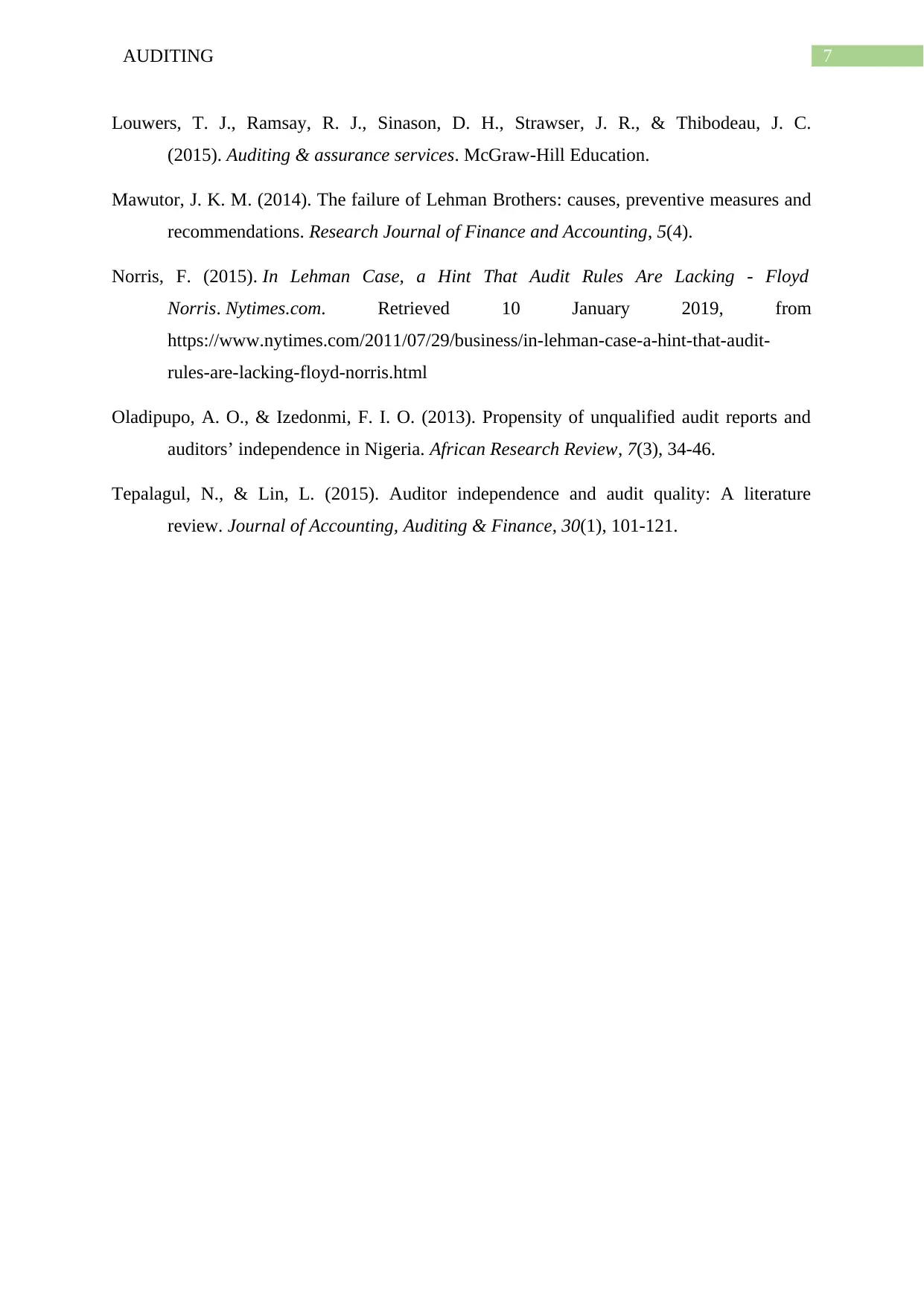
7AUDITING
Louwers, T. J., Ramsay, R. J., Sinason, D. H., Strawser, J. R., & Thibodeau, J. C.
(2015). Auditing & assurance services. McGraw-Hill Education.
Mawutor, J. K. M. (2014). The failure of Lehman Brothers: causes, preventive measures and
recommendations. Research Journal of Finance and Accounting, 5(4).
Norris, F. (2015). In Lehman Case, a Hint That Audit Rules Are Lacking - Floyd
Norris. Nytimes.com. Retrieved 10 January 2019, from
https://www.nytimes.com/2011/07/29/business/in-lehman-case-a-hint-that-audit-
rules-are-lacking-floyd-norris.html
Oladipupo, A. O., & Izedonmi, F. I. O. (2013). Propensity of unqualified audit reports and
auditors’ independence in Nigeria. African Research Review, 7(3), 34-46.
Tepalagul, N., & Lin, L. (2015). Auditor independence and audit quality: A literature
review. Journal of Accounting, Auditing & Finance, 30(1), 101-121.
Louwers, T. J., Ramsay, R. J., Sinason, D. H., Strawser, J. R., & Thibodeau, J. C.
(2015). Auditing & assurance services. McGraw-Hill Education.
Mawutor, J. K. M. (2014). The failure of Lehman Brothers: causes, preventive measures and
recommendations. Research Journal of Finance and Accounting, 5(4).
Norris, F. (2015). In Lehman Case, a Hint That Audit Rules Are Lacking - Floyd
Norris. Nytimes.com. Retrieved 10 January 2019, from
https://www.nytimes.com/2011/07/29/business/in-lehman-case-a-hint-that-audit-
rules-are-lacking-floyd-norris.html
Oladipupo, A. O., & Izedonmi, F. I. O. (2013). Propensity of unqualified audit reports and
auditors’ independence in Nigeria. African Research Review, 7(3), 34-46.
Tepalagul, N., & Lin, L. (2015). Auditor independence and audit quality: A literature
review. Journal of Accounting, Auditing & Finance, 30(1), 101-121.
1 out of 8
Related Documents
Your All-in-One AI-Powered Toolkit for Academic Success.
+13062052269
info@desklib.com
Available 24*7 on WhatsApp / Email
![[object Object]](/_next/static/media/star-bottom.7253800d.svg)
Unlock your academic potential
Copyright © 2020–2026 A2Z Services. All Rights Reserved. Developed and managed by ZUCOL.





